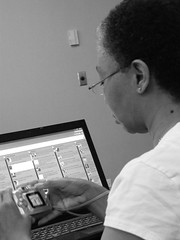By the way, I've added photos to these posts; however, I did not use any images or projected presentation in October.
 I began using a computer in the early 1980s. As computers became more prevalent, people in the workforce recognized that the needed to develop "computer skills". For some, that meant learning how to type documents and create spreadsheets. For others, it meant learning how to program. This divided the "computer users" from "the techies"...and I was a techie.
I began using a computer in the early 1980s. As computers became more prevalent, people in the workforce recognized that the needed to develop "computer skills". For some, that meant learning how to type documents and create spreadsheets. For others, it meant learning how to program. This divided the "computer users" from "the techies"...and I was a techie. Both the computer users and the techies had something in common - our skills were transferable. If I used an IBM computer, I could also use a DEC computer, or an Apple. Yes, there were some differences, but they were easily conquered. The real problem was gaining the initial skill. Once you made it over that hurdle, you were fine. And people wanted to make it over that hurdle. Parents implored their children to develop computer skills. Bosses encouraged their employees. Employees begged that their bosses learn how to use the computer themselves.
But wait...in the 1980s, computers were not everywhere yet. That changed as the technology got less expensive and different devices took on different aspects of the computer. Now computers are everywhere and in everything. Some of the devices used for computer input or output aren't even called by names that make you associate them with computers. If it doesn't look like a computer, are you using a computer?
Every evening, workers descend on the UPS facility in Syracuse to sort packages and load trucks. All of them use scanners to read in bar codes. Those bar codes allow packages to be tracked by UPS, as well as you and I. These scanners are easy for everyone to use and that means that there is no "skill" involved. So someone who is not computer literate can work at UPS and be an excellent employee, because that person can use a scanner. And sadly, that person can work there for years and never develop better computer skills on the job. Someone who is computer illiterate will remain so.
Every day a child enters the United States, who has not had a good education. That child goes to a K-12 school and hopefully finds that the school has access to good technology, which that child will be challenged to use. Unfortunately, it is also possible that the child will go to a school that has limited access to technology. That child, who lacked computer skills may go through our education system and still not develop good computer skills. When that child grows up, what job will she be able to do? If you think she'll go to college, which will lead to a better job, I would ask if a person with minimum computer skills can succeed in college? And as we become more technology-focused, what chance will that person have?
We know that libraries - K-12, public, academic and special - can teach children and adults, those born here and those born elsewhere - to use technology. Many people come to libraries for computer training and for computer help. We try to understand what skills they need and then how to give them those skills. We try really, really hard to make people better versions of themselves...and to give them a better life.
No comments:
Post a Comment